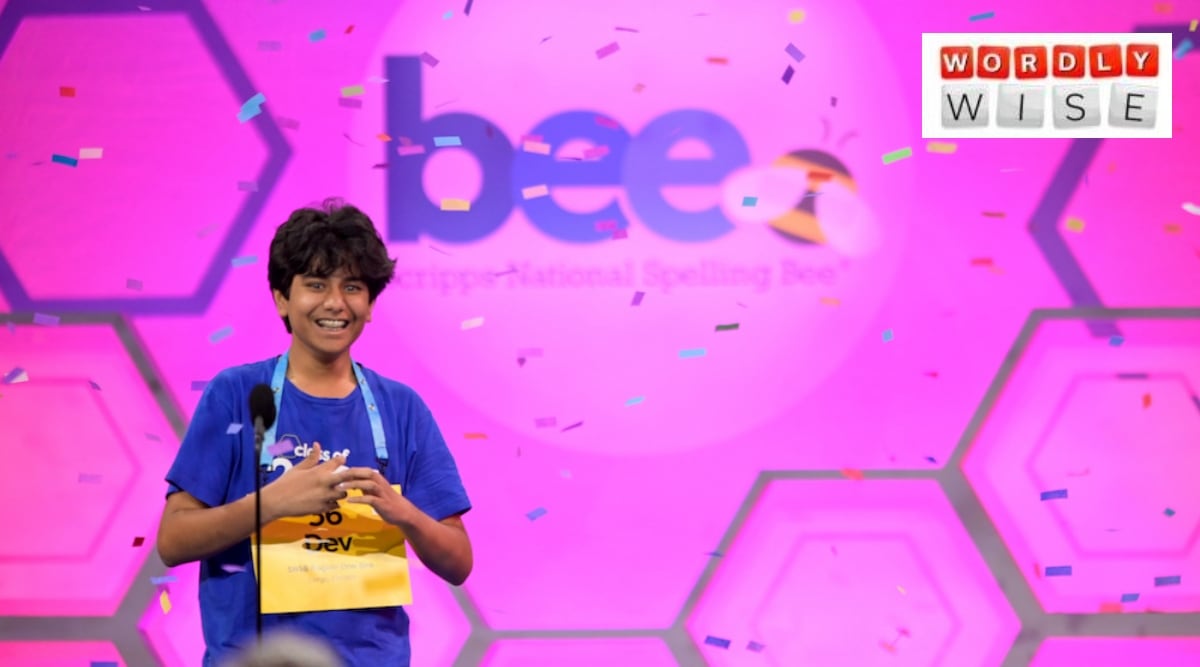The buzz about words: You are a genius if you can spell some of these correctly
After the conclusion of the 2023 Scripps National Spelling Bee earlier this month, this week's Wordly Wise looks at the winning words from the past five editions.
 Dev Shah won the 2023 Scripps National Spelling Bee competition after correctly spelling the word psammophile. (Scripps National Spelling Bee website)
Dev Shah won the 2023 Scripps National Spelling Bee competition after correctly spelling the word psammophile. (Scripps National Spelling Bee website) Chances are many of you by now would be able to not only spell ‘psammophile’ but also tell its meaning. With Greek root elements, it was the winning word that saw Dev Shah, an 8th grader from Florida lifting the 2023 Scripps National Spelling Bee trophy earlier this month.
According to Merriam-Webster, which is the official dictionary for the annual contest, psammophile is an organism that prefers or thrives in sandy soils or areas. It is formed from Greek psammos and phil, the first standing for ‘sand’ and the second for ‘one that loves, likes or is attracted to’. Philo and phile are commonly known related forms of phil, used as a prefix and a suffix, respectively. Remember philology and bibliophile?
Before Dev got this one right, he had to go through 14 rounds of spelling some of the most difficult words in the dictionary like bathypitotmeter, probouleutic, zwitterions, tolsester, rommack, aegagrus, schistorrhachis, poliorcetics, Perioeci, exhortation, cocomat and ardoise. That’s mind boggling!
I looked up the winning words from the five previous editions (the event was not held in 2020 due to the pandemic). Going back to 2017, the search revealed an interesting mix of 12 words, with different meanings, etymologies and usages. You may ask why 12 when it should be five. Read on.
The 2017 winning word was marocain, which is a crepe fabric made of silk, wool, rayon or a combination of these fibers and is distinguished by its cross-ribbed texture. It is used in the manufacture of women’s clothing. It comes from French ‘crepe moracain’, literally Moroccan crepe.
In 2018, the winner got koinonia right. Once again of Greek origin, it is used to refer to an intimate spiritual communion and a deep close-knit participation in a common religious commitment. The original Greek form ‘koinonos’ means partner, sharer or companion.
The 2019 edition presented a situation before the organisers that they had not faced before. The eight finalists out of 565 contestants, the maximum ever, kept spelling their words correctly till the organisers’ bank of words was exhausted. All the eight were declared joint winners. Here’s the list of the eight winning words (with their meanings as they appear in Merriam-Webster):
auslaut: final sound in a word or syllable
erysipelas: an acute febrile disease associated with intense edematous local inflammation of the skin and subcutaneous tissues caused by a hemolytic streptococcus
bougainvillea: any of a genus of the four-o’clock family of ornamental tropical American woody vines and shrubs with brilliant purple or red floral bracts. Another spelling that is less commonly used is bougainvillaea
aiguillette: a shoulder cord worn by designated military aides
pendeloque: a pear-shaped glass pendant used for ornamenting a lamp or a chandelier
palama: the webbing on the feet of aquatic birds
cernuous: of a plant: inclining or nodding; pendulous, drooping
odylic: of relating to odyl, or a force or natural power, formerly held by some to reside in certain individuals and things, and to underlie hypnotism, magnetism and some other phenomena
Murraya, the 2021 winning word, refers to a genus of flowering plants of a citrus family of tropical Asiatic and Australian trees having pinnate leaves and flowers with overlapping petals. An eponym – a word that is formed by the name of a person – it comes from New Latin and gets its name from Johan A Murray, a Swedish botanist.
The word moorhen that determined the winner of the 2022 trophy is comparatively an easy one. The name of a small aquatic bird that lives near water inhabiting ponds, lakes, etc., a moorhen is distinguished by a black plumage, red bill and a red shield above the bill. It is a species of the genus Gallinula, Latin for little hen.
The competition that tests the orthographic skills of young students has become ever more difficult over the years, perhaps due to the 2019 experience. The 2021 edition saw the introduction of a vocabulary round where spellers have to identify the correct meaning of the word as well. The last year saw the addition of the spell-off, a grueling round in which spellers try to spell as many words as possible in 90 seconds!
At 14, this was Dev’s third and the last attempt at the contest. In 2019, he bowed out in the quarter-finals. In 2021, a virtual competition, he was eliminated in the third round of preliminaries. This time, he outlasted 228 other competitors.
The moral of the story: perseverance pays.
- 01
- 02
- 03
- 04
- 05






































